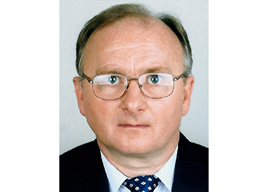





Prof. Tullio Antonio Maria Tolio
Politecnico di Milano – Italy
Tullio A.M. TOLIO is Full Professor of “Manufacturing and Production Systems” at Politecnico di Milano.Editor in Chief of the “CIRP Encyclopedia of Production Engineering”, President of AITEM (Italian Association for Manufacturing)and “Fellow” of CIRP (the International Academy for Production Engineering). Member of the HLG (High Level Group) of the MANUFUTURE Platform, served in the EU HLG on Key Enabling Technologies and is President of the ScientificTechnical Committee (CTS) of the Italian Cluster “Intelligent Factories” (CFI) and President of the CTS of the Lombardy cluster Intelligent Factories Lombardy (AFIL).
His research interests are in the area of configuration and reconfiguration of production systems, performance evaluation of production systems, circular economy, zero defect manufacturing. He is the author of two books and more than 170 publications on international journals and conferences. He has carried out research at the Laboratory for Manufacturing and productivity of the Massachusetts Institute of Technology (MIT).
During his career at Politecnico di Milano, he has covered the positions of: Head of the Ph.D. program in “Manufacturing and Production Systems”, Member of the Evaluation Board of the University, Delegate of the Rector of Politecnico di Milano on “Quality assurance in education”. He has been the Director of ITIA-CNR (Institute of Industrial Technologies and Automation of the National Research Council of Italy) in the period 2008-2018. In the period 2017-2019 he has been member of the National Habilitation Board of MUR (Italian Ministry of University and Research) for University professors in the area “Manufacturing and Production Systems”.
The road to the industrial intelligence revolution is paved by the development and evolution of system intelligence, often referred to as systelligence. It has two constituents, namely (i) synthetic system knowledge and (ii) application-specific computational mechanisms. The synthetic system knowledge (SSK) is partly pre-structured human knowledge processed by knowledge engineers, partly genuine system knowledge run-time acquired and inferred by reasoning and learning mechanisms. SSK is becoming abundant as the number and variety of intellectualized engineered systems is rapidly growing.
As part of systelligence, SSK is studied by sympérasmology, which has been proposed as the theory of synthetic system knowledge. The inquiry and analysis domains of sympérasmology have been sorted into four categories: (i) rudiments, (ii) principles, (iii) faculties, and (iv) implications.
Sympérasmology plays an important role not only in getting a better understanding of the teleology of SSK and deeper insights in its very nature and principles, but also in orientating industrial system developers how to construct and exploit the problem solving potential of SSK optimally and how to blend various bodies of system-specific SSK into an ampliative warehouse of synthetic system knowledge. As complement of gnoseology and epistemology, sympérasmology should be considered by systems scientists and philosophers, as well as by intelligence theoritians and knowledge engineers.

Prof. Dr. Imre Horváth
Delft University of Technology – Netherlands
Dr. Imre Horváth is emeritus professor of the Faculty of Industrial Design Engineering, Delft University of Technology, the Netherlands. His current research interests are in cognitive engineering of smart cyber-physical systems and in systematic design research. He published several seminal papers in both fields of interest.
He initiated the International Tools and Methods of Competitive Engineering Symposia. He is fellow of ASME, has honorary doctor titles, and received international awards for his contribution to science and engineering.

Prof. Peggy Zwolinski
University Grenoble Alpes – France
Peggy ZWOLINSKI receivedher M. Sc. Degree in Mechanical Engineering in 1995, and the Ph.D. degreefrom Lorraine University, in 1999. Her researchinterests lies in Integrated Design, Ecodesign, Life Cycle Engineering, End of Life strategies (remanufacturing, recycling, reuse) andCircularIndustrialSystems.
Sheisprofessor of engineering design and sustainable engineering at Univ. Grenoble Alpes since 1999. She has been head of the G-SCOP laboratoryresearch group on design for environmentfrom 2007 to 2015.
Peggy Zwolinskiisnowleading a large project ( https://circular.univ-grenoble-alpes.fr/ ) focused on creating an agile remanufacturing system aimed at streamlining the process of repurposingusedproductswithin the scope of circulareconomylaw.
















Copyright © ICCAD 2021